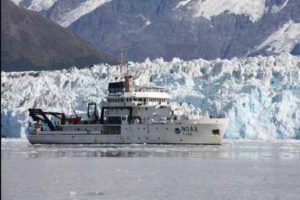NOAA Fisheries is soliciting input on its draft Climate Regional Action Plans to address climate-science needs in each region over the next three years
 Changing climate and oceans are affecting the nation’s valuable living marine resources and the people, businesses and communities that depend on them. From warming oceans and rising seas, to droughts and ocean acidification, these impacts are expected to increase with continued changes in the planet’s climate system.
Changing climate and oceans are affecting the nation’s valuable living marine resources and the people, businesses and communities that depend on them. From warming oceans and rising seas, to droughts and ocean acidification, these impacts are expected to increase with continued changes in the planet’s climate system.
NOAA has developed seven draft Climate Regional Actions Plans (RAPs) as part of our proactive approach to increase the resilience and adaptation of marine life and the people who depend on them. We are soliciting public comment on the plans to ensure a collaborative and inclusive approach in planning for climate-ready stewardship of fisheries and protected resources. We are particularly interested in input on the clarity of the goals and activities, ways to strengthen the plans, and what additional goals and activities need to be addressed.
“Our climate and oceans are changing – many areas around the world are experiencing changes in the distribution and abundance of marine resources associated with changing climate and ocean conditions” said Janet Coit, Assistant Administrator for NOAA Fisheries. “Building on our existing efforts, the Regional Action Plans will help provide decision-makers with the information and tools they need to prepare for and respond to changing climate and ocean conditions.”
The draft RAPs are three year, coordinated, cross-agency efforts to increase implementation of the NOAA Fisheries Climate Science Strategy (NCSS) in the Northeast, Southeast, Pacific Islands, West Coast and Alaska Regions. The draft plans respond to the growing demands for actionable information to prepare for and respond to climate-related changes in marine and coastal ecosystems. They include specific goals and actions to increase the production, delivery and use of climate-related information to support effective decision making concerning living marine resources and the many people who depend on them. The proposed actions will help track changes, assess risks, provide early warnings, and evaluate management strategies for changing conditions in each region.
The changing climate and oceans impact every aspect of NOAA Fisheries’ mission—from managing fisheries and aquaculture, to conserving protected resources and vital habitats. There is much at risk and we look forward to public input on our draft Climate Regional Action Plans to help mitigate that risk. Your comments will help inform the final plans and our direction forward.
Source: NOAA Fisheries-Office of Science and Technology
[content id=”79272″]






